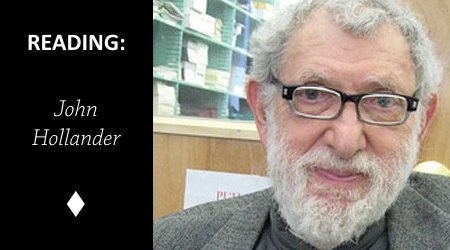The American poet John Hollander (1929-2013) was known for his language virtuosity. His most famous book for a wider audience was his 1981 introduction to form and prosody Rhyme’s Reason, a witty tour through the intricacies of poetry that you can borrow online. Some say that his poems lack personal engagement, that the emotion is never the author’s (which, following Eliot, it shouldn’t be). Here I read a short verse that gives you some impression of Hollander’s craft:
Dead Animals
Granted, then, that the punishment,
-Whether appropriate or not-for that
One tiny universal act (“Come, try it!”
“Yum-yum!”) of disobedience was Death,
It seems obscenely inappropriate
That all the other creatures, furry, smooth,
Scaly or feathered, shelled, gelatinous,
Great- or tiny-winged, swift-legged or slow
(I need-however lovingly-not name
Them all right now) have been condemned, like us,
To death, just to provide those symmetries
And analogues, just to allow us to
Compare ourselves to them whether or not
Condescendingly-I don’t know. I think
I’ll trade this one in for another story.
On offer is a precise and funny rephrasing of Genesis and our culture’s bullshit story of original sin. A ‘tiny universal act’ of disobedience because of a yummy Golden Delicious is totally inappropriate of course and the entire myth has been fabricated to channel a deep and dark hatred of life. Hollander doesn’t need such verbiage – suffice the word “obscene”.
He sums up the other creatures (I think he has a knack for completeness. Hollander was a celebrated anthologist and enjoyed formal perfection in poetry). Here, he skillfully implies weaker rhyme like slow-now or like us-symmetries or condescendingly-story. What do we make of his insecurity in the end? Which story does he want to trade, the book of Genesis, or his own poem (playing with meta-poetry is a common feature in Hollander’s work)? Or both?
The obscenity is that animals are mortal like us yet without sin. It allows us (compels us, maybe, it alliterates now and that’s what is really going on) to compare ourselves with the animals, to look down on them because they can’t be seduced, they have no will of their own against the flow of Being, as it were. The animals are there to make us go “look they die just like us but we have deserved to be treated like them because we have sinned; had we not sinned, we would also die, but we take on that burden consciously. Our reward is to feel better because we can name our situation. We have a mind that can create for us the illusion that we have an independent will and thus the ability to sin. Of course it is all bullocks, but that masochism gives us at least the satisfaction of being more ‘advanced’ than the animals.
Do you think this is what Hollander means?

One thought on “Reading: Dead Animals by John Hollander”
Comments are closed.